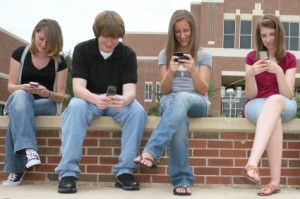Editor’s Note: Way Off the Grid is a satire feature of Off the Grid News. While the articles in this section may deal with current events, they are meant to portray these topics in a satirical and humorous light.
CLEVELAND – According to laboratory studies at Case Western Reserve University, young Americans ages twelve to nineteen can survive long periods without food as long as they are constantly connected to a cell phone with a strong message-texting plan. “At first, we started testing teens for eight to ten hours, and then we saw we could stretch it to twenty-seven hours quite easily,” said Robert Taney, lead researcher on the project.
 Then the real breakthrough came. Taney explained his graduate assistants accidentally left a group of twenty teens locked up over Christmas break. “They were in one of the back research rooms, and we were rushed to catch our flights back home,” said Julianne Reiter, graduate assistant. “I was ready to take full responsibility for my actions when I remembered them on New Year’s Eve. A week later I and the other assistants returned, and we hesitantly unlocked the research room.” Instead of disaster and criminal charges, the researchers found the twenty teens had been happily texting away for three entire weeks.
Then the real breakthrough came. Taney explained his graduate assistants accidentally left a group of twenty teens locked up over Christmas break. “They were in one of the back research rooms, and we were rushed to catch our flights back home,” said Julianne Reiter, graduate assistant. “I was ready to take full responsibility for my actions when I remembered them on New Year’s Eve. A week later I and the other assistants returned, and we hesitantly unlocked the research room.” Instead of disaster and criminal charges, the researchers found the twenty teens had been happily texting away for three entire weeks.
When each of the teens was asked whether he or she had been terrified during their encasement, the teens insisted with rolling eyes that only a half hour had passed. The group of twenty teens was made up of twelve males and eight females, all between thirteen and sixteen. Interviews revealed that none of the teens had realized other teens were in the same room with them during the three weeks. One of the teens, Jared Michaels, noted, “It wasn’t until the research people unlocked the door that I looked up and said, hey like, there are other people in the room. I’m hungry.”
Dr. Taney explained that further examination of the students showed that “teen metabolism actually slows to a near hibernation state during serious texting times.” His working hypothesis is that the body appears to redirect all its subordinate energy to the fingertips and narrowed eyes, while shutting down most of the rest of the body and brain. “We have run tests where we poke them with knitting needs and yell at them to take out the trash while they are texting and have not received any cognitive responses whatsoever. They are virtually brain dead during that period. It’s really quite a focused energy,” said Reiter.
Parents of the teens were largely undisturbed their children were missing for three weeks over Christmas. Most assumed they had been in their bedrooms since their doors were shut tight as usual. “We did start becoming suspicious, though,” said one of the mothers, Mary Galbraith, “because I didn’t have to purchase a gallon of milk every night.”
Taney soon expanded his experiments with teens, trying to extend the period without food to maximum limits. “We still haven’t found their breaking point,” he said. “We have ten research groups of twenty to thirty teens each. Most of them have gone four months without food.” Taney monitors the specific health of each teen through their phones, measuring a host of factors including respiration, heartbeat, metabolism, and more. “They are all perfectly healthy, and apparently they have important things to text about.”
Taney noted that two groups have turned dysfunctional, but he says it did not involve hunger or any medical conditions. The researchers provided different levels of texting plans to the various groups to gauge the causal connections between plans and metabolism. “With weaker plans, some of the other parts of their brains awoke out of hibernation and demanded access to other social media.” Another group faced the fiercest test when its cell service shut down for unknown technical reasons. The teens were without texting service for thirteen minutes, twenty-eight seconds. “It was an ugly scene. We lost three graduate assistants in the panic.”
The biggest critics of the study have been the video gaming industry. Taney’s research so far has shown that texting can easily replace the demand for video game entertainment. Taney has even documented cases in which male teens have texted for so long they have forgotten many of the basic functions of a video game controller. He has had to involve physical therapists to help some students regain their gaming abilities. Nathan Archer of Mojang Techtronic Games warned that an “overuse of texting skills can severely cripple the important skills of quick eye-flicking so central to the best video games. What will we do when our children can no longer flick their eyes back and forth at great speeds?”
Non-gaming corporations have taken quick notice of Taney’s research. Grants and research money have poured in. Businesses have considered retooling food-processing plants into high-tech centers of texting research and development. Other corporations and philanthropic groups seek to spread the hibernatory power of texting into some of the poorest areas of the world as a way to reduce food needs.
©2012 Off the Grid News











